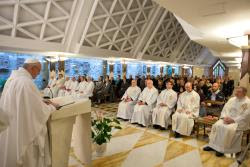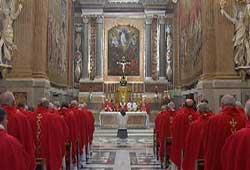THE IDEOLOGICAL ESSENCE OF THE CHURCHY MENTALITY OF THE 1970'S, POLLUTED SWAMP AIR, THAT POPE FRANCIS IS STRIVING TO OPEN THE WINDOWS OF THE CHURCH TO LET IN NEW AIR, SIMILAR BUT DIFFERENT IN NATURE TO WHAT POPE BENEDICT TRIED TO DO. THE 1970'S MENTALITY AMONGST THOSE MOST ENAMORED WITH IT, THE CURRENT GENERATION DYING OFF, IS TRYING MIGHTILY HARD TO BOX POPE FRANCIS INTO THEIR SWAMP-AIR MENTALITY, OF WHICH HE IS NOT!
The end all and be all of the 1970's mentality for the laity, women in particular:

I know nothing of the Benedictine priest who died recently and God bless his soul. But I did know Fr. Paul Philibert who I had for theology classes at St. Mary Seminary in Baltimore in the 1970's. Just to be clear, I liked him very much as a person and he was an excellent teacher. He had a great personality but was a bit eccentric, but aren't we all.
So my comments after this little bit of what he wrote recently as a review of the book
"A Virtuous Church" isn't about the deceased, for I do not know him and I offer a prayer for the happy repose of his soul. I simply want to comment on Fr. Philibert's 1970's perspective of which Pope Francis is moving the Church beyond, although Pope Francis as a Jesuit would be very familiar with the 1970's mentality for better and of course for worse and what he would see as the "clericalization" of the laity.
In the forthcoming May issue of
Worship Fr. Paul Philibert OP has a review of the recently released book
A Virtuous Church: Catholic Theology, Eithics, and Liturgy for the 21st Century. Philibert begins:
“A Virtuous Church,” [Benedictine Father] Kevin Seasoltz [who very recently died] analyzes the forces that have enabled the restorationist reaction to Vatican II. Drawing on the social sciences, biblical studies, the Catholic tradition of moral theology, and contemporary ecclesiology and liturgiology, he underlines how poorly founded and inept is the present option of the Church’s leadership for authoritarianism, centralization, and clericalism. With the Roman Catholic Church more centralized than ever before in its history, bishops have become vicars of the pope rather than vicars of the apostles, women feel intensely marginalized, and the laity have not been able to achieve fully the role proposed for them by the Second Vatican Council.
The review concludes:
The author writes that many people today “wonder whether the Lord Jesus, as master of the Church, has gone on a very long journey and left the Church as an orphan in [the] charge of rascals” (195). The deepest cultural challenges and opportunities for the Kingdom of God have been systematically ignored in order to buttress the Roman option for a classicist theology and for juridical approaches to ministry that mask the universal call to holiness and the universal responsibility for the Church’s apostolic life. The virtue of this book is that the author explains calmly and clearly what that means and how it happened. As a carefully documented work of theological synthesis, it will be not only enriching but also important for theologians and pastors, catechists and ecclesial ministers. We are in debt to the author for a potent prod to assess what we see happening in the Church and to address it, each of us within the sphere of our capacities.
MY COMMENTS: Fr. Philibert writes,
"Women feel marginalized in the Church?" Why? Because they can't be a bishop, a priest or a deacon? Is that the end all and be all of the Church? Yes, for the liberals of yesteryear, that is the essence of the Church, clericalism, whether it is the clericalism of the ordained, even if they be women, or the clericalism of the laity, which I use to call "laityism." It is all about the churchy things the laity do, whether they are in positions of control or not. Whether they are lectors, or altar servers, deacons or priests or bishops and that is the essence of the apostolic ministry to them. To Fr. Philibert it is about laity preaching from the pulpit of the Church, being the president of the parish council, being in roles of authority in the parish, the chancery and the curia. It is about all the things priests do in their clerical lives.
And I know that Fr. Philibert, very much in line with his 1970's theology, would like to see the laicization of the clergy, so they begin to act as laity, married with children and preoccupied by all the things of the laity that takes them away from the "churchy" things that this minority of men in the Church have traditionally taken care of so that the laity could be free to do the real work of the laity of being a leaven in their family, their work and their play, bringing the Gospel and the Catholic way of life to the secular world.
But for Pope Francis, who will be more collegial than his last two predecessors, this is all nonsense. He does not want the laity clericalized. He wants them to find their "ministry" which I would think would be more aptly called, "apostolate" in their lay state. So mothers and fathers have a more profound apostolate in the Church forming their children in the ways of faith, not as domestic administrators, but as mothers and fathers who nurture their children with love and show for the love of Holy Mother Church. I would suspect that the most important "ministry" that women have in the Church is precisely being mothers and wives if they are married, that that would be their primary and most important ministry. Wives show forth the nature of the Church as the bride of Christ. Together with the head of the family, the husband, they form the Church in miniature, caring for the family, and their children who could be considered the poorest of the poor, clothing them, teaching them, sheltering them and feeding them. This is what the Church universal is called to do as well on the institutional level and where the laity work primarily to promote the cause of Christ to the poor in their midst, whether the laity contribute to the needs of the poor, work directly with them, assist the government to take care of the poor in the political sense. The laity, the Catholic laity, are to bring Catholic sensibilities to all they do, political and otherwise!
Father Philibert characterizes the struggle in the Church as a
class struggle between the clergy and the laity that is epitomized in the liturgy of the Church with its 1970's mentality and flair. He would certainly have had disdain for Pope Francis' recent priestly ordination Mass where only men did the primary roles of the liturgy, bishops, priests, deacons and installed readers on their way to priesthood, who read the lessons and installed acolytes who functioned during the Mass. The only laity functioning in the Mass were the man and woman who brought the offerings to the pope and the laity in the choirs.
For Fr. Philibert, that recent liturgy of Pope Francis' is an insult to the laity and to Vatican II, so misunderstood by the 1970's generation still stuck in 1970. But for Pope Franics the laity who formed their boys in the ways of faith that led to their answering God's call to be priests is the most profound ministry that any parents could have, way above being pope, bishop or priest. Of course for Fr. Philibert, that doesn't count as it isn't mimicking the ordained life in churchy, liturgical things or in seizing clerical power in the liturgy, the parish, the diocese or the Vatican. How sad!
Compare what Fr. Philibert writes in his 1970's dying theology, and thank God for that--that it is dying, breathing its last breathes, because it smells like a polluted swamp, to the fresh air of Pope Francis. In fact, the 1970's generation, still stuck there, can't smell the bad swamp breath that they exhale with every word they write and speak:
"The reform that’s needed is “neither to clericalize nor ask to be clericalized. The layperson is a layperson. He has to live as a layperson… to be a leaven of the love of God in society itself…. [He] is to create and sow hope, to proclaim the faith, not from a pulpit but from his everyday life. And like all of us, the layperson is called to carry his daily cross—the cross of the layperson, not of the priest.”
MY FINAL COMMENT: Fr.Paul Philibert and others of his ilk of the 1970's musty, polluted swamp air era, despise Pope Benedict and his papacy and prior to that as Cardinal Ratzinger in the Congregation for the Doctrine of the Faith. Fr. Philibert fails to realize that the Holy Spirit was at and is at the core of every papacy no matter how good or how bad that papacy is and God will use every papacy for the advancement of the true nature of the Church as we walk forward in faith toward the Second Coming of Christ. Pope Francis' papacy would be quite different if it had merely followed Pope Paul VI's and not the previous three popes.
What Fr. Philibert and others of his 1970's mentality fail to recognize about Pope Francis building upon Pope Benedict, is that his vision of the Church isn't about continuing the liturgical wars or the ecclesiology wars or the lay ministry wars, it is about living our Catholic faith and the holiness of both the laity and the clergy, that from the Holy Mass and their popular devotions at church and home, leads them to trust in God's mercy (Penance), to go into their homes and workplaces and recreational places with the Good News, knowing that the Devil wants to thwart them, make them "churchy" and "worldly" and rob them of the love of Christ, His mercy and His true homeland for them, heaven.
It's time to move on from the ideologues of the 1970's, Fr. Paul Philibert and the one he reviews, and follow the new Pope into the new frontier Pope Francis sets before us! His papacy as Bishop of Rome will entail what Vatican II actually sought to do, reform the Church, meaning, renew the laity and clergy and show forth the simplicity of the Gospel and how to live it in the world, not so much in the institution of the Church that prior to Vatican II had become self-absorbed and clothed in too much trappings that made her appear to be aloof and apart from the world the majority of Catholics lived in, worked in and played in, a rupture between the secular and the sacred.
For the laity, the pre-Vatican II trappings of the clerical life, that of clerical power distributed to the laity, in the liturgy as lectors, Communion ministers, lay ecclesial ministers, leaders of prayer, parish council presidents, heads of departments in the chancery and in the Vatican's curia need to be revisited and stripped to the more essential roles of the laity in the secular life of the world.
It is easier to say one is a good Catholic depending upon their churchy role whether they are clergy or laity. It is much more difficult to say one is a good Catholic apart from the churchy, institutional things clergy and laity do, such as being a holy person and a good Catholic everywhere else after Mass and when one goes home, to work and to play!































